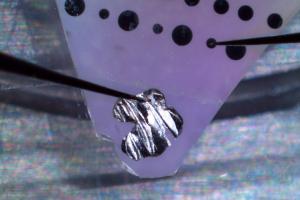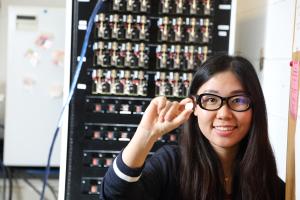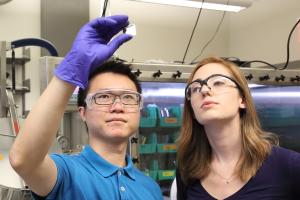Research @ UVA Engineering
Engineering for a Sustainable FutureEngineering a better future will require the best work of researchers collaborating along the spectrum from the tiniest building blocks of materials through the complex workings of entire societal systems. We work at the micro- and nano-scale in fields like heat transfer, catalysis and 2-D materials to identify fundamental properties of matter. Our goal is not simply to conduct research, but to pursue research with positive global impact.
-

Electrical Magnetic Optical Properties
Materials Science and Engineering Our research in electrical, magnetic and optical properties of materials makes modern computation and communication possible. -

Energy and Environment
Chemical Engineering Our chemical engineers are creating innovations in battery chemistry, solar materials, and impacting large-scale energy storage. They're also developing membranes for desalination, forward osmosis, osmotic power, and batteries. Additionally, they're engaged in bioremediation and designing biorenewable molecules to enhance safer and sustainable chemical production and combustable. -
Engineering Materials and Design
Mechanical and Aerospace Engineering -

Human-Technology Interaction
Systems and Information Engineering When people interface with technology, complex questions arise: from automous control timing and priority, risk and decision analysis, usable haptics, and computing, and integrating human and machine intelligence, our researchers are improving humans’ ability to work effectively in complex technical systems. -

Hypersonic Research
Mechanical and Aerospace Engineering UVA has over 35 years of experience in hypersonic technology development and hypersonic ground and flight testing. We have 17 faculty that are actively conducting research in hypersonics-related or hypersonics-relevant areas. Our core strengths lie in air-breathing propulsion and materials for hypersonic applications. -
-
Hypersonics
Mechanical and Aerospace Engineering -

Information and Intelligent Automation
Systems and Information Engineering Exploring intelligent, automated technology and method development and innovative ways these intelligent systems can improve society. -
-

Materials Engineering and Nanotechnology
Chemical Engineering Our nanotechnology research explores polymer nanocomposites, nanomaterials, and advanced polymer membrane materials, including semiconductor and nanoparticle research, metal-organic frameworks crystal growth, and engineering biomaterials for diverse applications like tissue engineering, drug delivery, and electronic devices. -

Operations Research and Analytics
Systems and Information Engineering Systems researchers model, analyze and improve the most complex systems in th world, using analytics. , including machine learning and artificial intelligence, optimization, stochastic processes, and discrete-event and agent-based simulation to improve domains from manufacturing, human health, defense and energy. -

Photonics
Electrical and Computer Engineering We lead in photodetector research on high-speed, high-power photodiodes and low noise avalanche photodiodes.